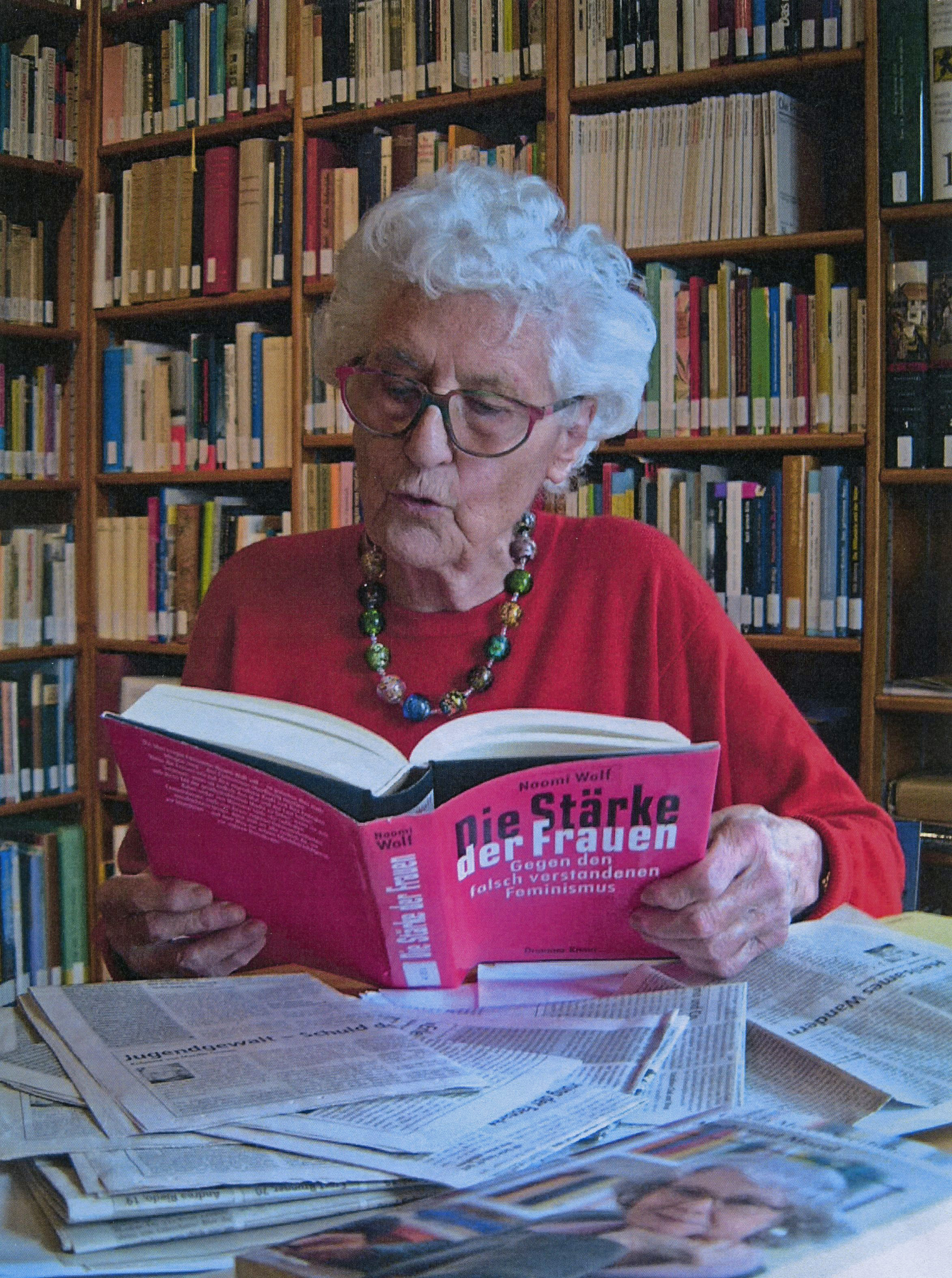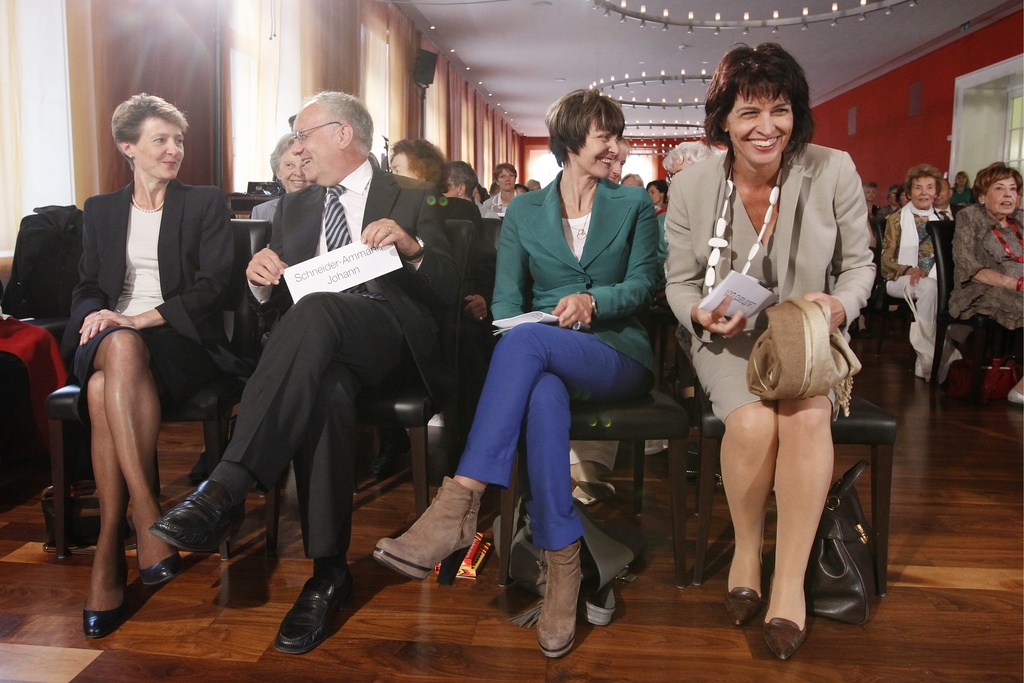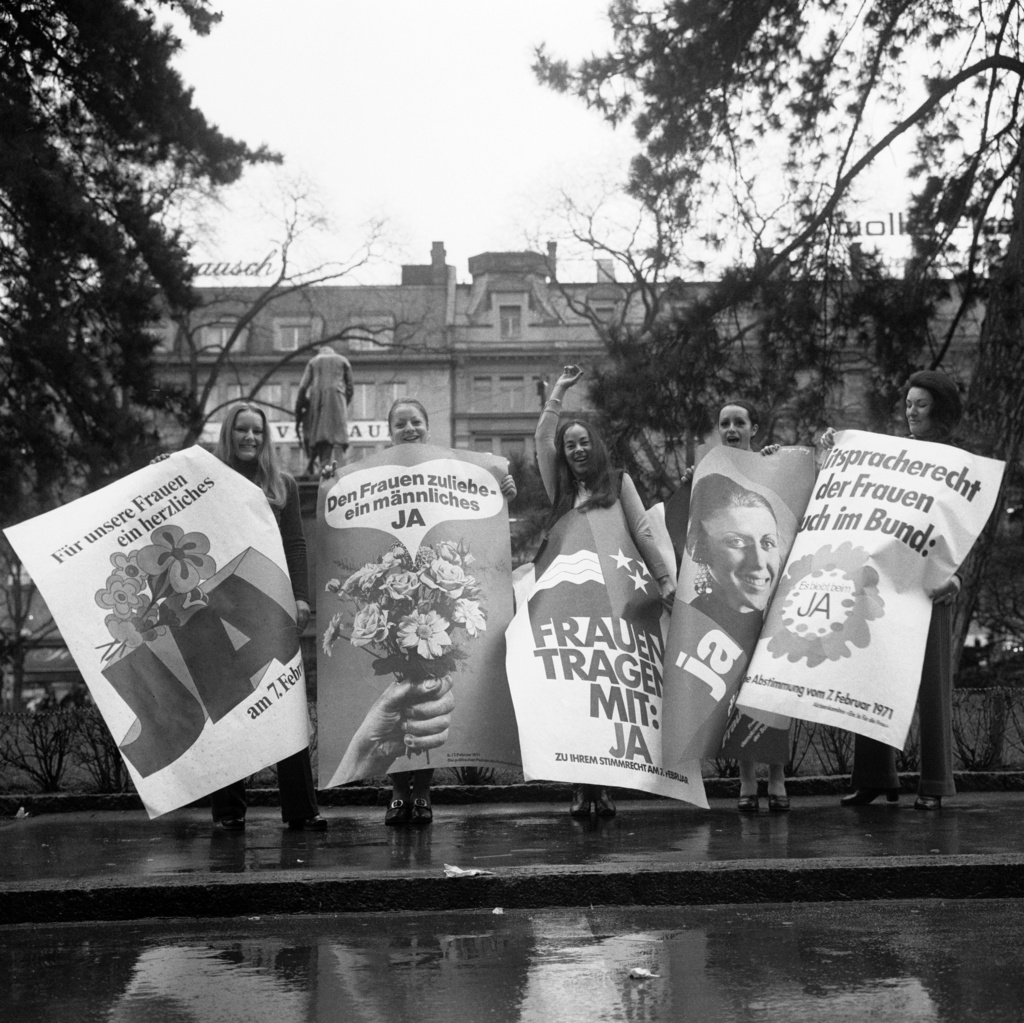Tireless women’s rights campaigner honoured

Marthe Gosteli, the 94-year-old doyenne of the Swiss women’s rights scene, was honoured for her life’s work with a human rights prize.
She received the prize at a ceremony in Bern on December 10 – Human Rights Day – from the International Society for Human Rights Swiss Section.
Despite her age, Gosteli – who receives the award along with Bern emeritus professor of history Beatrix Mesmer – is still involved in the Gosteli Archive on the history of the Swiss women’s movement, “although it doesn’t really need me anymore,” as she laughingly told swissinfo.ch.
The pioneer described the women’s rights movement as “one of the biggest liberation movements of the last century”. “And it remained without bloodshed,” she added.
Gosteli was born into a farming family near Bern which was very interested in politics. Her grandfather sat in the Bern cantonal parliament and her father was very active in centre-right circles.
Her mother was upset about her lack of legal rights in her marriage, “although my father was no macho” , remarked Gosteli. This was what prompted her lifelong interest in equality for women.
Suffragette
When Gosteli joined the women’s movement in around 1940 she recognised that some ground had already been laid by 19th century pioneers.
By the beginning of the 20th century the loosely organised radical women’s rights activists were, however, being denounced as “suffragettes”.
“I was also called a suffragette,” Gosteli said. “In my life I have experienced everything – from the highest honours to the nastiest slander.”
Opposition – not just male – developed to the activists who were perceived as being a bit too militant and not always acting in the right way. Society was not ready to accept women having the same rights as men.
Milestone
It took 50 votes – all decided by men – before Switzerland finally allowed women to vote in 1971, one of the last European countries to do so. Gosteli said a lot of work had been done to convince people of the merits of the change.
But opponents had carried out a fierce campaign, using rather crude posters to warn of the “perils” of women voting.
Gosteli said that she was surprised at just how many educated women took part in the “no” campaign, despite the fact that “they had only been able to study thanks to the early women’s movement”.
Women’s suffrage 40 years ago was an important milestone. But the whole fight was exhausting and Gosteli found that even when she learned of the positive result, “it was a relief but I was not jumping around for joy”.
“I was simply happy that we had won.”
Different methods
The grande dame of what had in origin been a more liberal, centre-right women’s movement joined the women of the “new” movement – young feminists from the political left – for the 1991 women’s strike for equality of pay. “I was invited,” Gosteli said.
The strike was a new method in the fight for equality. “My way and that of the women’s movement pioneers was different. It was based on raising awareness, training and education – all long-term work,” observed Gosteli.
Women’s level of knowledge was not so high. “In the countryside, for example, women didn’t even know how their local community worked.”
The strike didn’t achieve much, she concedes. There is still no equal pay and women are in a minority in management positions.
“But I’m not in favour of quotas for women,” Gosteli said. “Many women who work for state institutions have told me that they don’t want to be quota woman. I wouldn’t want to be one either.”
Education deficit
Gosteli believes the lack of interest of young women today in the history of the women’s movement doesn’t come from them simply taking equal rights for granted. Nor does she believe that they lack self-confidence.
“It’s more that there is an catastrophic education deficit concerning women’s issues,” she said.
“Education is the key,” points out Gosteli. This is why her Gosteli foundation this year published a brochure about the history of the women’s movement which can be used in secondary schools.
As for the future, Gosteli says she has no plans to slow down. Her greatest wish would be a Swiss National Science Foundation study on the Swiss women’s movement.
According to co-prize recipient Mesmer, this was one of the best organised in Europe – even if women had no political rights before 1971.
On December 10, 2011 both Marthe Gosteli and Beatrix Mesmer received the 2011 human rights prize from the International Society for Human Rights Swiss Section.
Gosteli has long fought for women’s suffrage and has built up the Archive on the History of Women in Switzerland near Bern.
Former history professor Beatrix Mesmer was the first woman to be appointed into Bern University’s management in 1989 and has researched the women’s movement.
Marthe Gosteli was born in 1917 on her parents’ farm in Worblaufen near Bern. During the Second World War, she worked in the army press and radio department. Afterwards, she was in charge of the film department of the information services at the United States embassy in Bern.
From the mid 1960s she used her media knowledge for work in the women’s movement, holding high positions in several women’s organisations.
During 1970-71 she presided over the consortium of the Swiss Women’s Unions for the Political Rights of Women. It was this organisation’s negotiating skills with parliament that were instrumental in achieving the acceptance of women’s suffrage.
Gosteli founded the Archive on the History of Women in Switzerland, and in 1982, the Gosteli Foundation. The archive contains around 400 documents from organisations and private individuals, as well as biographical material about the pioneers and a library.
In 1995 she was made an honorary doctor of Bern University.
(Translated from German by Isobel Leybold-Johnson)

In compliance with the JTI standards
More: SWI swissinfo.ch certified by the Journalism Trust Initiative















You can find an overview of ongoing debates with our journalists here . Please join us!
If you want to start a conversation about a topic raised in this article or want to report factual errors, email us at english@swissinfo.ch.